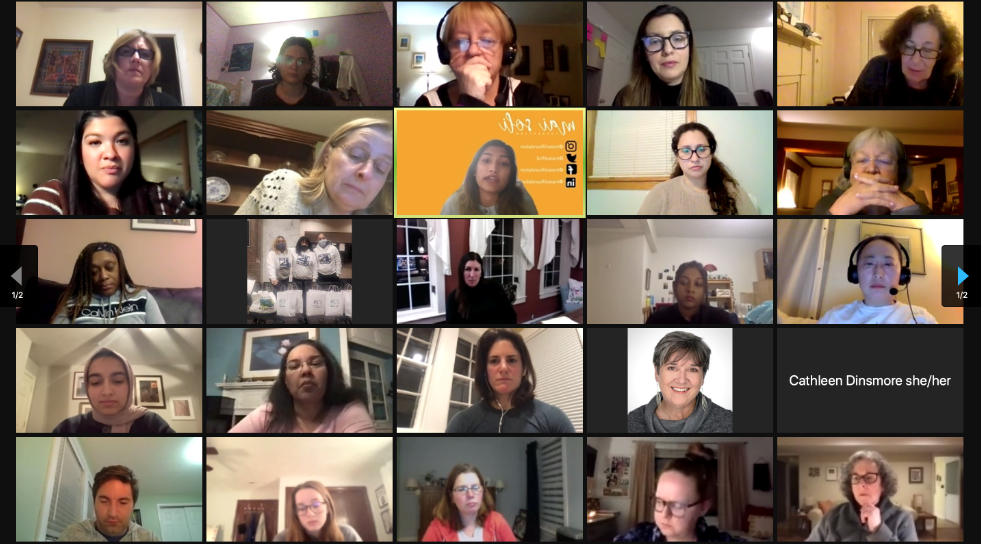By Talia Heisey
***
[broadstreet zone=”52093″]
FRAMINGHAM – “I find I talk about racism, and I’m overwhelmed by it. My story of racism is one of missed opportunities. I was hampered in my career, I lost valuable time with the death of my father. I miss new friendships due to guarding and fear. I feel I’ve had every advantage and it’s still not enough to overcome my skin color and gender.”
These were the words of Anelise Horah, one of seven Black, Indigenous and People of Color (BIPOC) women to give oral testimony at the Metrowest Commission on the Status of Women’s virtual public hearing last night, February 2 titled “Confronting Racial Prejudice and Systematic Oppression in the MetroWest.”
Testimony came from women of all ages representing numerous Metrowest communities and advocacy groups. Their testimony was told to a rapt audience of 45 which was composed of eight commissioners, three state representatives, and the general public.
The Metrowest Commission, was introduced by chair Heather Panahi at the start of the hearing as, “represent[ing] 26 towns and cities in our 26 towns in two cities in the Metrowest region and we are committed to providing a permanent and effective voice for women and girls across the region. We work with community partners as well as our elected officials to ensure that the women and girls, both identify as women and girls in our region feel supported and heard.”
Panahi continued her introduction by acknowledging the necessity of such a hearing, “racial prejudice and systemic oppression have deep historical roots though some progress has been made over the last few decades, the inequities and challenges that many of our neighbors and friends of color, particularly those who identify as female face are manifold.”
[broadstreet zone=”59945″]
The first testimony was provided by Leslie Credle, an organizer with Families for Justice as Healing introducing the very personal lived experience many of the testifiers had with the activism work they were a part of and were using the platform the event provided to advocate for. As a formerly incarcerated woman, Credle stated she was providing testimony as a part of her organization’s advocacy against the building of a new women’s prison in Norfolk.
The issue of incarceration in Massachusetts for Credle extends beyond her personal experience to the issue of mass incarceration plaguing the community she lives within.
Families for Justice as Healing represents Credle stated, “communit[ies of] Roxbury, Dorchester, and Mattapan are one of the highest rate of incarcerated communities in Massachusetts … we are over policed and … represent a lot of the incarcerated individuals inside prisons in Massachusetts. Although our black and brown people … make up a minority of the population in this state we make up the majority of the population and prisons…Policing and incarceration is a tool to marginalize black and brown people and as a means to oppress”
Credle, who lives in Roxbury, continued advocating to the committee for the end of this by drawing upon her own experiences as a formerly incarcerated person, focusing on the dangers she’s experienced which prisons present to their female inmates, “the administration and the people that work in that prison, when they walk in the door they don’t have to abide by the rules and moral laws of the world, and no one is going to hold them accountable, and their superior officers are going to cover up their injustices at any means possible so we are considered..prey..they do what they want to us and if we try to speak out about it we are silenced.”

Credle’s testimony was contrasted with Anelise Horah of Norfolk.
“I haven’t experienced the racism that a black person in an inner city is live with and testifying as a representative of the black American experience, makes me uncomfortable. I’m going to testify on what I know. I’m over 50, I have lived in the wealthier suburbs of Worcester for over 20 years.” said Horah. “I’m a veterinarian. I’m financially comfortable. I live surrounded by white people … access to good hospitals, stable jobs, good schools for my children, but I’m surrounded by faces not like mine.”
Continuing her testimony, Horah said “I went to top schools, graduated at the top of my veterinary school class at Tufts. I tried to go even further, but things fell apart when I went for further schooling in Indiana. I was even more in a minority. The lack of support was huge. After a few racist clients I was asked to see a therapist in order to learn how to be even more accommodating to white people. I decided to give up. With the protests last year I went back to talk with … faculty in Indiana, to find out what had happened. I was told that there were people who did not want me in their program. Due to my gender and skin color.”
Horah discussed the impacts racism has had on the lives of her loved ones, particularly that of her father, who “died of a stroke at age 67.
“He had a lot of fears and mistrust of the medical community as do a lot of black people,” she testified. “At the time of his stroke I found that his systolic pressure was over 220 that he hadn’t been medicated, that’s extremely high. He had been seen by a doctor that month. How could it be that no one had insisted he’d be on blood pressure medication. How come he was never rechecked, this must have been a problem for years. How can it be that he died of such an easily controlled problem?”
[broadstreet zone=”59984″]
The injustice and deadly impacts of the medical system’s racial biases was mentioned in multiple testimonies, not just by Horah but also in the testimony of Chien-Chi Huang, the founder of the Asian Women for Health.
After being diagnosed with Breast Cancer in 2005, Huang began working across language barriers to educate and inform Asian Women about cancer by creating Asian Breast Cancer Project.
Huang continued her testimony by educating the hearing’s audience on the health disparities Asian American women face, then addressing her organization was attempting to address them, and how she hoped the State would be able to help in certain instances.
Through, the “nail salon outreach program we actually visit the nail salon workers and we give them information to encourage them to keep up their screening, because in Massachusetts, and also nationwide Asian women has the lowest screening rate for pap smear test,mammogram[s], and also colonoscopy,” she said.
Huang explained the financial barrier preventing some women from seeking screening, “when we talked to the nail salon workers, we asked them, you know, what is the reason why they don’t do the screening because they know it’s important to do the screening, and that’s the only reliable way to detect cervical cancer, and they said that, you know, they can’t really take time off to go to see the doctors…In Massachusetts, all the state employees…they can take time off to seek preventive care. I was wondering if the legislator can help change the policy to ensure that all women regardless, who their employers are…can afford…to get the screening done.”
[broadstreet zone=”59948″]
The advocacy work that is often done by immigrants and their first generation children to communicate across cultural, physical and language barriers was continued in Aria Mustary’s testimony by organization, the Mai Soli Foundation, which works to end child marriage.
Inspired by her mother who was a child bride, Mustary’s organization “combat[s] child marriage internationally is through leadership, confidence, financial literacy and entrepreneurship education.”
This work has extended into the Commonwealth where “Massachusetts law still allows children under 18 to wed with parental consent and judicial approval” despite the impacts of these marriages where the girls participating in them “are at risk of harm to their health, education, poverty and domestic violence.”
The virtual nature of the event allowed for more informal forms of conversation and discussion, where community members and those giving to learn from each other.
During a lull in the hearing, Muriel Kramer, a resident of Hopkinton, spoke out in support of “Justice for Families As Healing’s advocacy work, causing Huang her own frustrations with the legal system due to a case she’d testified in, connecting her with Credle’s organization.
[broadstreet zone=”59946″]
While the virtual nature of the hearing provides unique opportunities of connection a formal in person hearing may not, Tiffany Ramsarran’s testimony also reflects the struggles the pandemic created for advocacy work.
Ramsarran, a student at Babson College who grew up in Hopkinton, whose work focuses on human trafficking primarily used her testimony to ask for support and help thinking of new, virtual ideas for her advocacy work.
The power of the Black Lives Matter Movement in the summer of 2020 was displayed by the advocacy work it inspired in two of the women who testified.
Mariam Ibrahimi, a junior Simmons College and resident of Norfolk, testified to the impact the protests had on her decision to join Northborough’s Diversity and Inclusion Committee, “I think as a Muslim woman who’s also youth in my town. It was incredibly important to me to be a part of to share my perspective, and definitely actively work to make this town truly more diverse and inclusive.”
For Margaret Musoke, a resident of Ashland, and founder of Ashland Equity, much of her advocacy work began because of a conversation she had with a friend during the Black Lives Matter Movement where at the time she felt “racial injustice is embedded into everything, our daily lives. … I just want to do something.”

Musoke’s work focuses business, civic involvement, on the pervasive issue of institutionalized racism in education. Musoke gave the example of, “if a child is not challenged they have not placed her in the right class and so, this kid is gonna end up being bored in class. If a kid is not challenged then the trend that’s gonna happen is a kid is going to [act out] in class because they’re bored distracting others and next thing. The kid is called out of class [to] go to detention ,,, Their rap sheet is starting right there young age and now the kid is seen as the bad kid … the system is failing them”
To combat this, Musoke’s group works with the Ashland public schools to increase the number of BIPOC teachers in the schools in addition to working towards understanding and questioning the way teachers decide Advanced Placement.
The experience of racism in the school system was echoed in Horah’s testimony, who noted “my children are extremely gifted but … they [had] teachers who are unable to see that past the color of their skin.”
Near the end of the hearing, State Representatives Hannah Kane and Jack Patrick Lewis were both asked by the Commission to give their reflections on the hearing.
I came to listen and to learn and … I think successfully done both tonight,” said Rep. Kane. “I think sometimes we don’t do enough listening in the role that I’m in.”

Kane said by discussing the work she’d done in the Massachusetts House of Representatives with the Women’s Caucus, “our appointments to the Mass Commission on the Status of Women, and we have been very deliberate in making sure that we are acknowledging that diversity is key to the success of that condition and making sure that we’re working with the commissioners to identify where there are gaps.”
Kane concluded by thanking those who testified for “for speaking so powerfully and so truthfully, about the experiences that you’ve had and will, I guarantee you make a difference”
Representative Lewis agreed with Kane’s line of thought. “We came to listen tonight,” said Rep. Lewis, who represents Framingham & Ashland. “The stories you’ve shared are powerful and there’s such great power and your willingness to share them, but also the outcome of that sharing. As you already know the ripples go outward from this conversation”.
The hearing ended with a call not just for increased awareness of how the Committee itself participates in the systems of White supremacy and inequity they were holding the hearing trying to end.
Huang told the Commission, “I feel [it] is much needed to diversify the body of the Commission because I think … predominantly it’s … white women who are commissioners.”
Chair Panahi, when asked by the digital news outlet of the Commission’s makeup said “two—or a quarter of our Commissioners—identify as women of color. We also have one commissioner who is a first-generation American, as well as four different religions represented in our small group. That said the MWCSW recognizes the need for greater diversity and representation not only in our own commission but in programs and organizations throughout the MetroWest. In fact, BIPOC outreach and recruitment is one of our top priorities this year.”
“Our hope tonight is to begin to highlight the challenges and barriers that our BIWOC constituents and their families face, so that we can begin piecing together an action plan that seeks to address inequities on all levels, from the classroom to the board room and everything in between,” said the Commission to SOURCE. “This is only the beginning of what we imagine will be a long journey, but one that the MWCSW is fully committed to.”
***
Talia Heisey is a 2021 spring intern for SOURCE. Heisey is a current sophomore at the University of Massachusetts Amherst, pursuing a bachelor’s degree in journalism and English. They has been a contributor to the Amherst Wire’s campus news section since 2019, focused on covering the impact of COVID upon the UMass community. They has previously participated in the Center for Strategic and International Studies’ Journalism bootcamp program.
Editor’s Note: Report was updated at 4:55 p.m. on February 3 to fix the spelling of Heather Panahi’s name. Updated on February 8 to fix name of Families for Justice as Healing organization.
[broadstreet zone=”70106″]
[broadstreet zone=”70107″]

